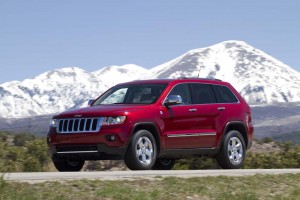
In 2011, China placed anti-dumping tariffs on vehicles like the Jeep Grand Cherokee. The WTO ruled the tariffs violated the rules of the organization.
Domestic automakers and the Obama administration have won a moral victory as the World Trade Organization sided with the U.S. in a dispute with China over duties on imported American automobiles.
“This is the third time that the United States has prevailed in a WTO dispute challenging China’s unjustified use of trade remedies,” U.S. Trade Representative Michael Froman said.
“The message is clear: China must follow the rules, just like other WTO members,” he added.
General Motors, Chrysler and Ford all sell vehicles built in the U.S. and could benefit from the ruling. Lower duties could reduce the prices on some vehicles, mostly luxury cars and sport utility vehicles, and improve their sales prospects.
However, all three of the American automakers are committed to strategies to build cars in China, which means the impact of the ruling may be blunted. The ruling, though, could make it easier for them to sell special American-made vehicles, such as the Chevrolet Corvette, Ford Mustang or Dodge Challenger, in China and to fill in holes in the premium segments, which are expected to expand in the future.
Back in 2012, the Obama administration lodged a complaint with the Geneva-based WTO challenging Chinese duties on auto imports from the U.S. A separate U.S. filing also complained that China has unfairly subsidized its automakers and auto parts manufacturers.
China imposed anti-dumping tariffs of 2% to 8.9% on American cars and SUVs with engines displacing more than 2.5 liters in December 2011. They alleged the vehicles were being sold to Chinese dealers for less than the cost of making them.
China also imposed additional anti-subsidy tariffs of 12.9% on large-engine passenger vehicles from General Motors and 6.2% on similar vehicles from Chrysler, which were mostly Jeeps.
The Chinese government said the government-backed bankruptcies of GM and Chrysler effectively acted as a subsidy for the automakers’ exports.
Since 2009, the U.S. has filed 17 cases at the WTO against China and other nations, including Indonesia and India, according to the U.S Trade Representative’s office. The U.S. doubled the rate of filings against China during that time.
(The 10 most stolen, and recovered, vehicles. For more, Click Here.)
China’s “unjustified duties” affected about $5 billion in automobile exports, Froman said. “This is also an important victory that impacts our nation’s workers and their families,” he said.
(Click Here for details on why May could be the best auto sales month in a decade.)
In March, the WTO backed the U.S. in another case by agreeing that China’s limits on exports of rare-earth elements used in hybrid-car batteries and wind turbines violate trade rules.
The U.S. also escalated the trade battle with China by accusing five military leaders of stealing corporate secrets. The indictments are on top of complaints over a range issues.
(To see why Orlando is the most dangerous place in the U.S. for pedestrians, Click Here.)
The latest WTO ruling may not have an immediate practical effect, but it is seen as potentially important for American businesses, as it might discourage China from putting up anti-dumping or anti-subsidy tariffs in response to foreign trade actions that it dislikes in the future.
“This is an important case, and it’s an important victory and it is important for the auto industry,” said Rep. Sander Levin, (D-Mich.) and a prominent trade hawk. “It’s important for manufacturing.

The international trade games are so absurd and unfair it’s just a disgrace.
Occasionally, at least, something gets done right.
Paul E.